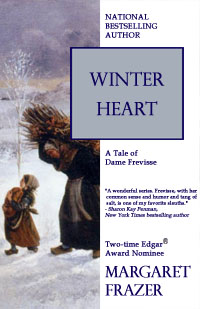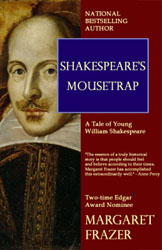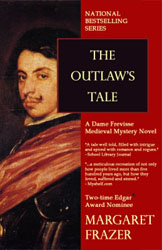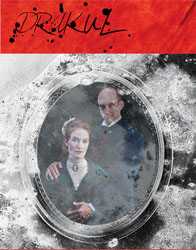 I have something a little out of the ordinary for you today: An interview with Margaret Frazer, the award-winning author of the Dame Frevisse and Player Joliffe mysteries. As I’ve mentioned recently I’ve been producing book trailers for her novels. She’s recently released the e-book novella Winter Heart and she’s on a blog tour to celebrate. (Hence the virtual visit.)
I have something a little out of the ordinary for you today: An interview with Margaret Frazer, the award-winning author of the Dame Frevisse and Player Joliffe mysteries. As I’ve mentioned recently I’ve been producing book trailers for her novels. She’s recently released the e-book novella Winter Heart and she’s on a blog tour to celebrate. (Hence the virtual visit.)
A lot of people reading the Alexandrian are mostly interested in roleplaying games. A big challenge in roleplaying games is creating worlds and getting players to invest in them. In your books you do an amazing job of creating the world of medieval England. How do you get in that mindset? What sort of details do you use for creating that world for the reader and making them care about it?
Margaret: I’m a big fan of going otherwhere and otherwhen. When I got interested in medieval England, lo, these many years ago and wanted to get inside the heads of the people, I started reading everything I could find. I began with the easy-read, no-footnotes kind of books. Those led me on to biographies, and those had not only footnotes but bibliographies, and I’ve ended by reading not just scholarly works about the Middle Ages but what medieval people actually recorded about themselves – the stories they wrote down, their chronicles, the account rolls, the illustrated fight manuals made at the time. When I travelled, I went to medieval places – castles, cathedrals, ordinary churches, ordinary houses, battlefields, highways that have existed since Roman times. Anything and everything that would let me see their world as they did. When I belonged to the Society for Creative Anachronism, I wore medieval clothing, learned and used the manners and some of the arts of the time, authorized in sword and shield fighting and fought in melees. I know what it is to have in my hand a sword so beautiful balanced it practically lives, and what it is to go into close combat with the very real possibility of being hurt – not killed in this case but definitely dramatically bruised and battered!
Relating this to roleplaying, I can tell you I fully understand the adrenalin surge that carries your characters forward into a fight regardless of the danger! Because of all that, I have more than a book-knowledge of medieval life. I have a feel for what it was like, and that feeling informs my stories, making it possible for me to draw the reader in, for them to feel it, too. And what a reader feels, they hopefully care about.
Quite a bit of “Winter Heart” dwells on the matters of memory and age. Are those issues which have a particular resonance for you right now?
Yes. Several chronic ailments have been making my life a tad hellish of late. I’m being forced to embrace my “inner elderly” somewhat before the time I expected. But as with every other happenstance that comes to an author, the thought (unbidden and ineradicable) at the back of the mind remains “I have to remember how this feels. I can use it in a story sometime.”
“Winter Heart” is being released as an e-book. I know you’ve been working to get your older books available online as well. You often joke about living in the Middle Ages, so why are you embracing the “digital age”, so to speak?
Long before I came to medieval England, I was reading science fiction with vast delight, and it’s still where I go for refreshment. Why, I was [insert doddering old geezer’s voice] watching the original “Star Trek” before it was in reruns! So I’m fascinated with the wild things modern technology is coming up with. Also wary and
inclined to keep a safe distance (see above: geezer), but I have sons who keep putting things in my hands and showing me how great they are. That said, when flip-open cell phones first appeared, I had a hard time taking them seriously – I mean – really – they’re straight out of “Star Trek”, right?
The great thing with having my mind spread over several time periods – I like Prehistory as well as Medieval and Modern – is that by doing a kind of time travel, I see modern life from a different perspective than if I were immersed in only it and no other when or where. Those otherwhens and otherwheres let me see my own world with shadows and highlights I might otherwise never perceive.
Will we eventually see some of these books back in “real” print?
Almost certainly. My hope is to eventually have them all available in all the possible forms. It’s not my fault that technology keeps coming up with new forms faster than I (or rather, my Computer Person) can keep up with them! But we’re trying. That said, I must add that “real” print is still majorly important to me. Just a look at my home will tell anyone that. Nearly all available wall space is lined with bookshelves, and the shelves are mostly full. There’s a lot of general reading but nearly half of the books are for research – everything from fashions and fabrics, to recipes and how to set the lord’s high table, to agriculture and village life, to running the royal bureaucracy, to studies of warfare and particular battles, to politics, religion, economics, philosophy, international trade, and more. Medieval times were complex and far more multi-faceted than the clichés of most novels, tv shows, and movies show. I need to understand all of these aspects of medieval life in order to tell my stories well.
Isn’t that a lot to cram into a story?
I leave most of it out of my stories. All of it informs what goes into the stories, but very little actually surfaces. And when it does, I try to make it flow with the narrative, not intrude on and interrupt the story. “Winter Heart” was a particular exercise in this, because a number of aspects of medieval life are wound together to make the plot and yet I couldn’t allow them to obscure the action, only enhance. To put in all the facts needed to take a reader into another time and place, while keeping my research invisible, is the lovely and unending challenge I enjoy in all my books and stories.
That’s interesting. I talk about similar issues for Game Masters trying to parse out necessary information to their players in Getting Your Players to Care. Getting readers (or players) to invest can be tough, but it can be impressive how much depth you can build up — and how immersive you can make a fictional milieu — when you can develop it over time. You’ve been writing the Dame Frevisse books more than two decades now. How do you keep a series like that fresh?
I’ve been asked if I don’t get bored with writing the same book over and over again, and the simple answer to that is that I don’t write the same book over and over again, so I don’t get bored. This notion of writing the same book over and over apparently comes from the fact that a great many books are written to formula. If it’s a mystery, someone has to be dead very early in the book, preferably in the first few pages. Then there has to be a requisite amount of violence, conflict between the detective and some authority figure, and (if the author knows what’s good for her/him) a romantic/sexual entanglement. Following that template over and over would indeed bore me cross-eyed. So I don’t follow it. In many of my books I keep deliberately clear of those clichés. I’ve written one book where someone is dead in the very first pages, but usually there’s no corpse until much later in the book, when the reader has had time to get acquainted with the characters, making the death when it comes a far more personal matter. Too, in the Dame Frevisse series the story is told from two points of view – the main character’s and the title character’s – so that every book explores a different aspect of medieval society, letting me look at the world from all these different angles, keeping the stories fresh, and me very far from bored!

















